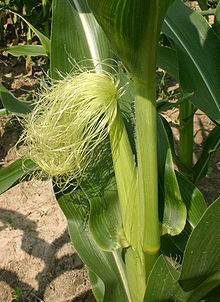柱頭 (花)
外观



柱頭(英語:stigma)位於花的心皮(或多個心皮愈合)的頂端,以花柱連接子房。傳粉時花粉落到柱頭上,並萌發出花粉管以到達胚珠。柱頭通常具有粘性,並演化出各種不同有利於接受花粉的形式[1],花粉可能透過風傳遞到柱頭(風媒傳粉),也可能透過動物或水流。
柱頭的外形變異很大,有細長型或圓形,並可能具有毛。當花粉離開花葯時,通常是呈脫水狀態,抵達柱頭後柱頭有助花粉濕潤並萌發花粉管[2]。柱頭可以確保萌發的花粉屬於同種植物,還可以執行孢子體自交不親和性,避免基因型太接近的花粉萌發出花粉管,以蕓薹屬植物為例,花粉壁具有S基因的產物SCR[3][4] (皆為富含半胱胺酸的蛋白質),S基因可能具有高達百種基因型,彼此間有漸進的顯隱性關係。柱頭則具有稱為SRK的膜蛋白,在胞內有激酶的活性區域[5][6],不同種SRK是不同種SCR的受體。另外柱頭還產生一種稱為SLG的蛋白質,該蛋白與SRK序列類似,可能是SCR的共同受器,用以增強訊號[7]當SRK與SCR配對時,會使SRK的激酶區域自體磷酸化,並經過尚不清楚的下游途徑傳遞訊息,阻止花粉管萌發[8]。
參考資料
[编辑]- ^ The Penguin Dictionary of Botany, edited by Elizabeth Toothill, Penguin Books 1984 ISBN 0-14-051126-1
- ^ Anna F. Edlund, Robert Swanson and Daphne Preuss. Pollen and stigma structure and function: the role of diversity in pollination. Plant Cell. 2004, 16 (Supplement): 84–97 [2015-01-21]. doi:10.1105/tpc.015800. (原始内容存档于2020-09-30).
- ^ Schopfer, C. R., M. E. Nasrallah, and J. B. Nasrallah. The male determinant of self-incompatibility in Brassica. Science. 1999, 286 (5445): 1697–1700. PMID 10576728. doi:10.1126/science.286.5445.1697.
- ^ Takayama, S., H. Shiba, M. Iwano, H. Shimosato, F.-S. Che, N. Kai, M. Watanabe, G. Suzuki, K. Hinata, and A. Isogai. The pollen determinant of self-incompatibility in Brassica campestris. Proc. Natl. Acad. Sci. U.S.A. 2000, 97 (4): 1920–5. PMC 26537
 . PMID 10677556. doi:10.1073/pnas.040556397.
. PMID 10677556. doi:10.1073/pnas.040556397.
- ^ Stein, J. C., B. Howlett, D. C. Boyes, M. E. Nasrallah, and J. B. Nasrallah. Molecular cloning of a putative receptor protein kinase gene encoded at the self-incompatibility locus of Brassica oleracea. Proc. Natl. Acad. Sci. U.S.A. 1991, 88 (19): 8816–20. PMC 52601
 . PMID 1681543. doi:10.1073/pnas.88.19.8816.: .
. PMID 1681543. doi:10.1073/pnas.88.19.8816.: .
- ^ Nasrallah, J. B., and M. E. Nasrallah. Pollen–stigma signalling in the sporophytic self-incompatibility response. Pl. Cell. 1993, 5: 1325–35. doi:10.2307/3869785.
- ^ Takasaki, T., K. Hatakeyama, G. Suzuki, M. Watanabe, A. Isogai, and K. Hinata. The S receptor kinase determines self-incompatibility in Brassica stigma. Nature. 2000, 403 (6772): 913–6. PMID 10706292. doi:10.1038/35002628.
- ^ Schopfer, C. R., and J. B. Nasrallah. Self-incompatibility. Prospects for a novel putative peptide-signaling molecule. Pl. Physiol. 2000, 124 (3): 935–9. doi:10.1104/pp.124.3.935.
